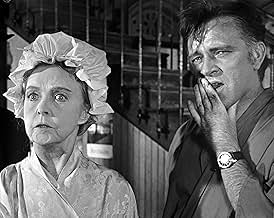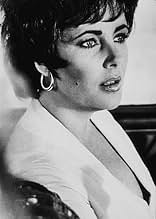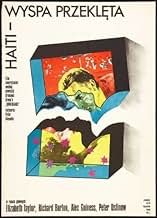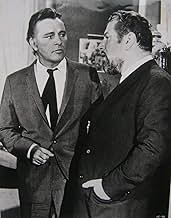Ein zynischer walisischer Hotelbesitzer treibt heimlich eine Romanze mit der Frau eines Diplomaten in Haiti, unter der gewalttätigen Herrschaft des Despoten "Papa Doc" Duvalier.Ein zynischer walisischer Hotelbesitzer treibt heimlich eine Romanze mit der Frau eines Diplomaten in Haiti, unter der gewalttätigen Herrschaft des Despoten "Papa Doc" Duvalier.Ein zynischer walisischer Hotelbesitzer treibt heimlich eine Romanze mit der Frau eines Diplomaten in Haiti, unter der gewalttätigen Herrschaft des Despoten "Papa Doc" Duvalier.
- Auszeichnungen
- 3 Gewinne & 1 Nominierung insgesamt
- Haitian Soldier
- (Nicht genannt)
- Haitian Soldier
- (Nicht genannt)
- Angelito Pineda
- (Nicht genannt)
- César
- (Nicht genannt)
Empfohlene Bewertungen
The great storyteller that he was, Graham Greene must have woven the elements of this story together very well in his novel. But here we have two big separate stories butting heads with one another. The first is the adulterous love affair between the two leads, Richard Burton as Brown and Elizabeth Taylor as Martha. The second is the plight of the people of Haiti living in a constant state of terror under the ruthless Duvalier and his henchmen. But then, two other elements that Greene no doubt worked into his single story, here appear to be separate stories awkwardly sandwiched into the two main stories. They are the businesses of Major Jones, played by Alec Guinness, and of Smith, played by Paul Ford. The end result is a plot with many subplots – all poorly connected.
Besides the leads, the film has several stellar actors. Guinness and Ford are joined by Peter Ustinov as Ambassador Pineda, Lillian Gish as Mrs. Smith, and James Earl Jones as Dr. Magiot. A handful of others in the supporting cast also give good performances in the film.
The direction and editing are weak. The cinematography is good and the location does a good job showing the scenery and conditions as they might have been in Haiti from the late 1950s through most of the 20th century. But for that historical connection and the performances of the supporting cast, this film is hardly worth watching. At the end of the movie, it seemed to me that I had been watching a belabored story about a sex-driven but frustrated white hotel owner in Haiti who couldn't find fulfillment in anything he did.
Movie fans who enjoy history may find Duvalier's story interesting. He was a physician who treated the poor and suffering people of Haiti in his early life. That's where he got his endearing moniker from the people, "Papa Doc." He was elected president in a free open election in 1957. But he soon became crazed with power. He killed 30,000 of his countrymen and established a reign of fear and terror, while the poor of his country suffered all the more.
The Comedians holds one's interest, although it's on the long side. The cast is remarkable: Burton, Alec Guinness, Peter Ustinov, Taylor, James Earl Jones, Lillian Gish, Georg Stanford Brown, Roscoe Lee Brown, and, in a small role, Cicely Tyson. Taylor is very beautiful, although her accent is all over the place. She sounds French in the beginning, then English, then like Elizabeth Taylor, and then in the middle of the movie, we find out she's German.
Though Burton went the schlock for cash route in his career, he was a wonderful, handsome actor with a remarkable voice. Towards the end of the film, he has a scene with Guinness that is well worth the wait - two great actors in a subdued and remarkable scene.
The Haitian scenery belies what lies underneath. It's a film that is perhaps more timely today than it was in 1967.
"I have no faith in faith," rants Brown (Burton) the anti-hero of the film--a typical Greene character (compare with Greene's 'The Burnt-out case'). Cynicism is turned into comedy. The splashes of Catholic motifs made in passing reference ("defrocked priest") hark back to Burton's earlier role in "Night of Iguana." Guinness' reference to looking like a "Lawrence of Arabia" recalls his own role as Prince Faisal in Lean's movie. Not having read Greene's book, I am not sure whether Greene introduced these clever details into the script to suit the actors or whether the details had previously existed in the book.
The gradual unmasking of the Major (Guinness) is a treat creatively captured by Glenville and Greene. The final speech made by Burton to his group of ragged rebels seem to have a common "comic" thread with George Clooney's speech to his soldiers towards the end of the recent Mallick's "The Thin Red Line".
Ustinov's diplomat and Taylor's vulnerable diplomat's wife, who admits to her lover that he is the fourth "adventure," are both comedians--Greene's likable misfits who cannot change their destiny and are strangely reconciled to accept their inevitable end. All the four main characters are "prepared" for their destiny they have designed for themselves as a consequence of previous actions in life. The closing shot of the film is a shot of a suggestive blue sky, redeeming the foibles of the comedians on terra firma.
I admit that when I saw the film some 20 years ago, I did not appreciate the film as I do now. I was missing the forest for the trees. This film does not belong to Burton, Taylor, Guinness, Ustinov, Jones or Lillian Gish. It belongs to Greene, Glenville and the French cinematographer Henri Decae.
I do not imply that Burton was not good--but George C Scott said one should evaluate a performance by remembering the character more than the actor. It is in that context that I remember the four main characters. Burton's kisses are different here than say in "Boom" or "Cleopatra"--only to add detail to the character. Taylor is strangely subdued only to add power to her smoldering role. Guinness gradual unmasking is pathetic yet endearing only to add more substance to the character. Decae's camera captures details that shocks--e.g., empty drawers in desks to collect bribes, public executions of rebels watched by school kids...
I am surprised that this film, to my limited knowledge, has never been taken seriously for what it offers--a superb script, commendable acting, good direction, and some fine camera-work.
Graham Greene does a respectable job of paring down his complex novel for the screen, and director Glenville keeps the film moving at a reasonable pace in spite of its lengthy runtime of 150 minutes. The film is always interesting and occasionally gripping, although Greene and Glenville keep the audience at a relative distance which prevents the picture from striking as hard as it could have. Burton is in good form, and Alec Guinness, Paul Ford, and Lillian Gish all turn in top notch support (only Peter Ustinov feels under utilized). Unfortunately, Taylor is dreadfully miscast as a German military wife complete with a woefully unconvincing accent and her ill-fitting presence creates several lulls in the film as the number of scenes between her character and Burton's character are increased (in order to give the diva her proper screen time) which hampers a few long stretches of the film and slightly undermines what could have been a first-rate effort.
WUSSTEST DU SCHON:
- WissenswertesSeveral critics noted that the ending of this movie is at least a little more positive and optimistic than the bleak ending of Graham Greene's original novel, and attacked the movie for "softening" the subject. Graham Greene, however, insisted that the more upbeat ending had been his own idea.
- PatzerIn the last few shots in the movie, as the Character is leaving the airport, there is initially a departing Vickers VC10 airliner flying overhead from right to left, this changes to a close up, followed by a shot of the same airliner now flying into the distance - unfortunately this is different 4 engine Jetliner, probably a Boeing 707.
- Zitate
Brown: I don't believe in causes.
Dr. Magiot: The role of cynic doesn't really suit you, Brown.
Brown: I don't believe in play-acting either.
Dr. Magiot: You imagine because you've lost one faith, you've lost all? You're wrong, Brown. There is always an alternative to the faith we lose.
Brown: I have no faith in faith.
- VerbindungenFeatured in Die Komödianten in Afrika (1967)
Top-Auswahl
- How long is The Comedians?Powered by Alexa
Details
- Erscheinungsdatum
- Herkunftsländer
- Sprachen
- Auch bekannt als
- The Comedians
- Drehorte
- Produktionsfirmen
- Weitere beteiligte Unternehmen bei IMDbPro anzeigen
Box Office
- Bruttoertrag in den USA und Kanada
- 5.200.000 $
- Laufzeit2 Stunden 30 Minuten
- Farbe
- Sound-Mix
- Seitenverhältnis
- 2.35 : 1
Zu dieser Seite beitragen




































